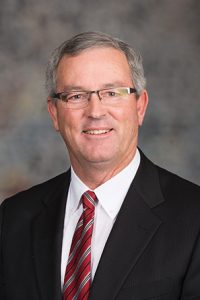Smoking, vaping restrictions sought
The General Affairs Committee considered three bills Feb. 3 designed to reduce smoking and vaping by teenagers and young adults.

LB862, introduced by Sen. Dan Hughes of Venango, would make it a Class V misdemeanor for anyone younger than 19 to possess tobacco, electronic nicotine delivery systems or alternative nicotine products.
Hughes said he introduced the bill after consulting with school administrators.
“Our schools are having a difficult time dealing with the problem of underage vaping and this bill will give them one more tool to combat that problem,” Hughes said.
Kyle McGowan, speaking on behalf of the Nebraska Association of School Boards, Nebraska Council of School Administrators and Nebraska Rural Community Schools Association, testified in support of the bill. He said involving law enforcement would add weight to the message that smoking and vaping are dangerous.
“To stay after school or have your pack of smokes taken away tends to not be as big a deterrent as turning it over to the police,” McGowan said.
Megan Myers, speaking on behalf of the Nebraska Council of School Administrators, also testified in support of LB862. Myers, also the principal at Waverly High School, said vaping has increased in recent years at her school, particularly among freshman and sophomores.
“If they were issued a ticket, or if there was a consequence outside of school, that would help regulate e-cigarette use in our buildings,” Myers said.
Nick Faustman, representing the American Cancer Society Cancer Action Network, spoke against the bill. He said LB862 would distract from the true problem—retailers selling to underage customers.
“Evidence-based best practices should focus penalties on the tobacco retailers who profit from the illegal sales rather than the youth that is likely addicted,” Faustman said. “It’s easier to conduct compliance checks on retailers rather than youth.”
The committee also discussed LB1176, introduced by Sen. Tom Briese of Albion, which would ban flavored liquid vapor products that taste like fruit, candy, alcoholic beverages or other non-tobacco flavors. The bill would not ban menthol or tobacco-flavored liquids. Anyone selling a banned flavor would be guilty of a Class III misdemeanor.
Briese said the bill mirrors a recent U.S. Food and Drug Administration announcement that it would prioritize enforcement of non-tobacco-flavored vape cartridges because tobacco flavored vapor products can be useful for smoking cessation.
“[LB1176 would] curb youth use and access to such products while still allowing legal adults to choose such products,” he said.
Andy Hale, testifying on behalf of the Nebraska Hospital Association, spoke in favor of the bill, saying it would reduce health care costs.
“We think this is one step in reducing [the use of] cigarettes,” Hale said.
Sarah Linden, president of Nebraska Vape Vendors Association, testified against the bill. She said when vape manufacturer Juul removed a mango-flavored product from the market, it merely caused people to switch to a different flavor.
“Teens vape primarily for the buzz they receive from high-nicotine products,” Linden said. “Teens will continue to vape whatever flavors are available as long as high-nicotine products are available.”
Finally, LB1064, also introduced by Briese, would increase the legal age to use and purchase tobacco, cigarettes, cigars, electronic nicotine delivery systems or alternative nicotine products from 19 to 21.
The Legislature passed a bill last year to raise the tobacco and vaping age to 19, Briese said, and later Congress increased the federal legal age to 21.
“This created enforcement confusion,” he said. “If we do not raise and enforce the new federal age of 21 we could at some point risk losing certain federal block grants.”
Maggie Ballard of Heartland Family Service testified in support of the bill. She said raising the legal age would promote public health.
“We have so much scientific evidence, that maybe hasn’t caught up to our laws, that demonstrates that the human brain is not fully developed until age 25,” Ballard said.
Kathy Siefken, executive director of the Nebraska Grocery Industry Association, also testified in support, saying that a consistent legal purchasing age throughout Nebraska would level the retail playing field.
No one testified in opposition to the bill.
The committee took no immediate action on any of the bills.

